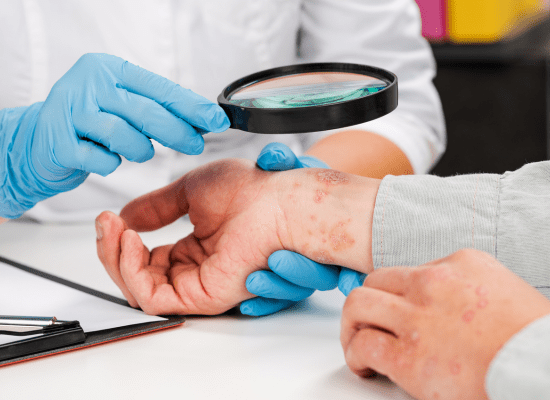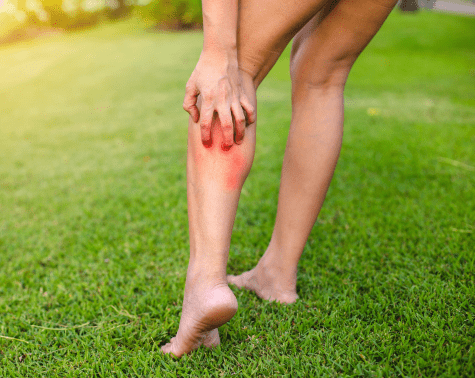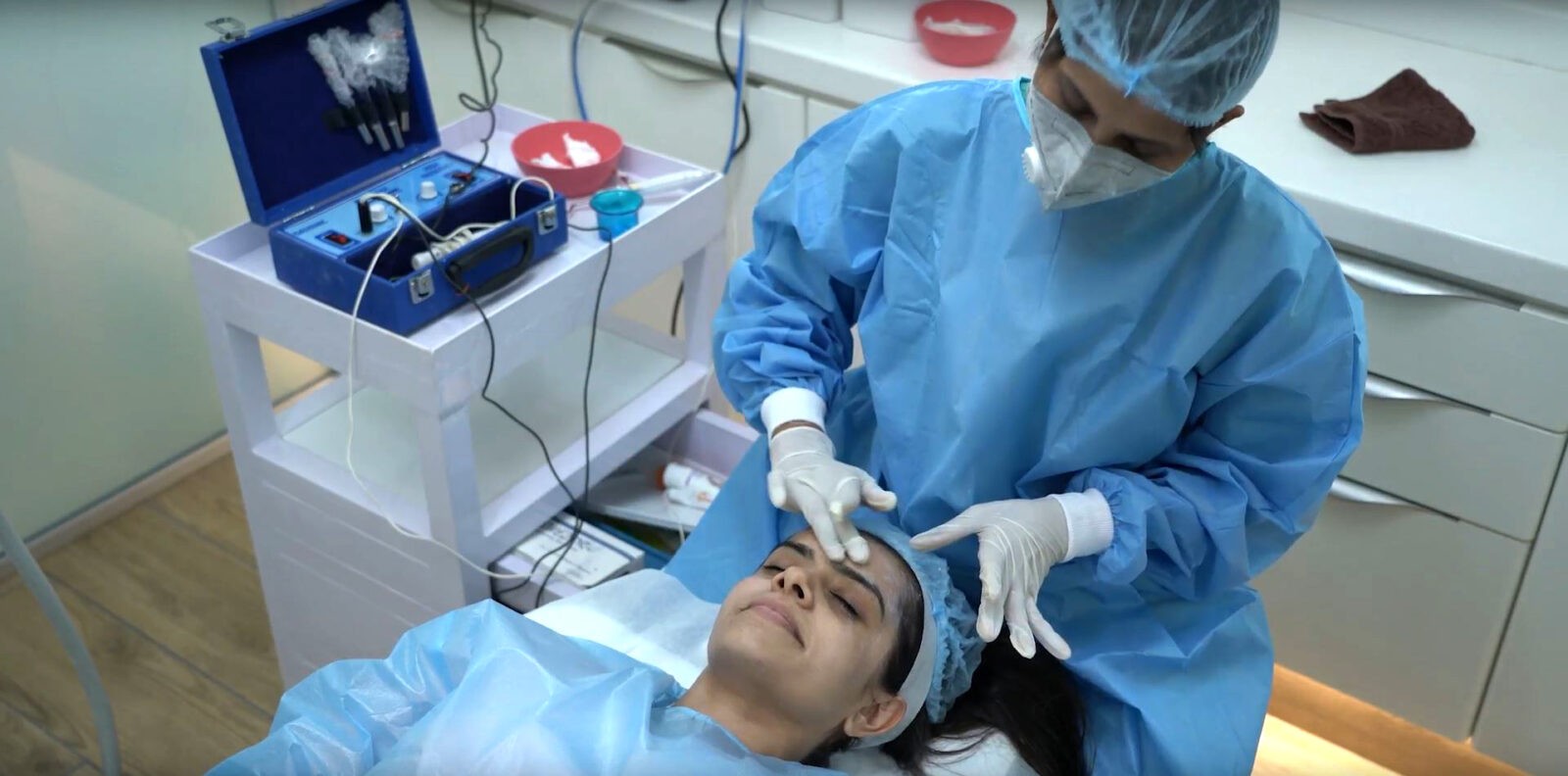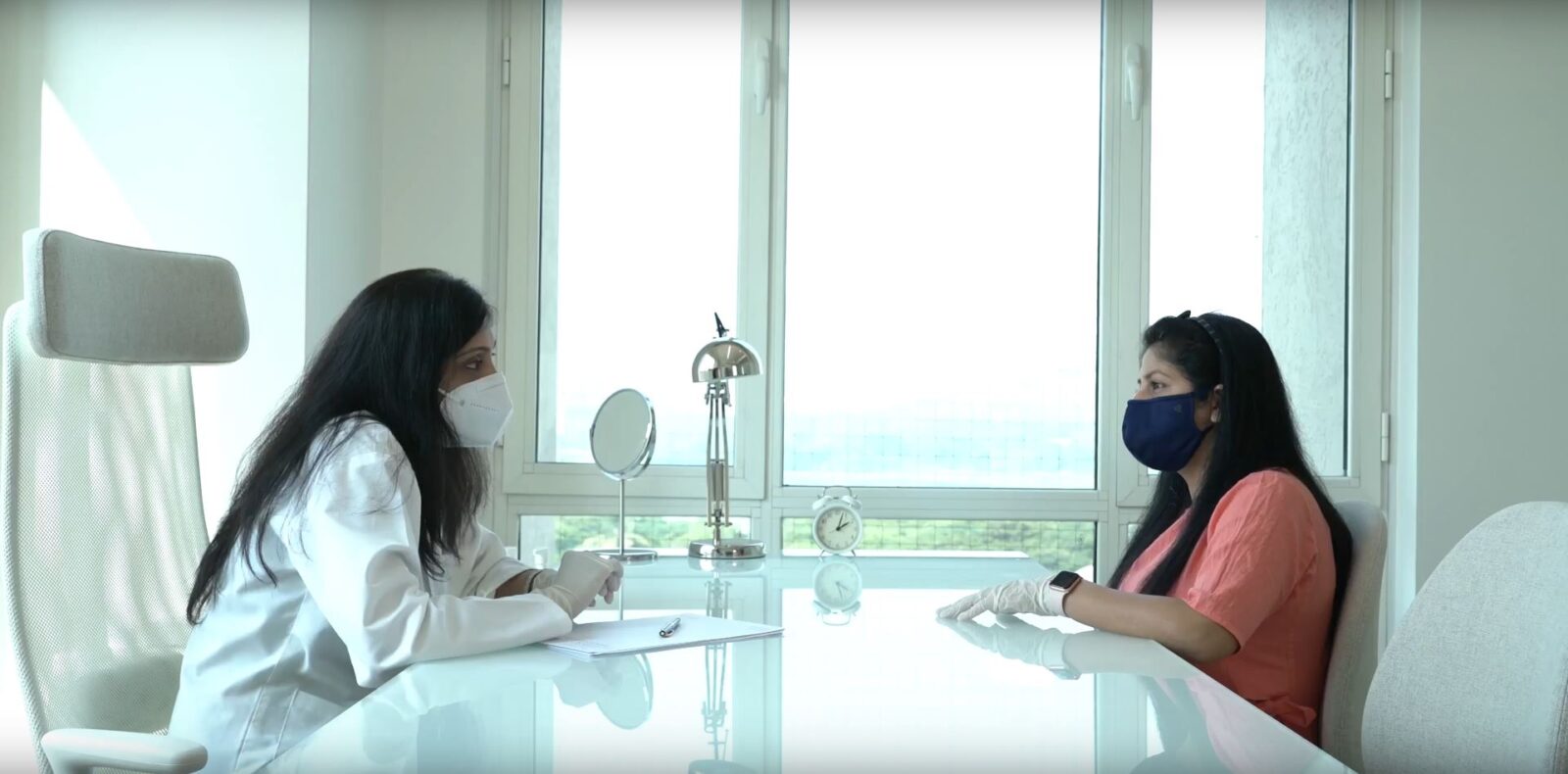






InUrSkn is more than just a skin a hair and body clinic. It is Dr. Sejal's promise of providing minimal intervention patient care which is holistic, personalized and humane.













Insect bite skin allergies arise when a person’s immune system overreacts to proteins in insect saliva or venom, such as those from mosquitoes, fleas, or bees. This reaction can cause localized redness, swelling, itching, or, in some cases, a widespread allergic response. The severity of the reaction varies among individuals; some may experience minor irritation, while others might face severe reactions, including anaphylaxis. Management measures for this allergy include avoiding insect bites, using antihistamines, and seeking immediate medical attention for severe cases.
Read More
A drug or medicine bite allergy on the skin is an adverse reaction to medications resembling a bite, caused by oral, topical, or injectable drugs. Common symptoms include redness, swelling, and itching. The body’s immune system treats the drug as a foreign substance, triggering the allergic reaction. Identifying and discontinuing the offending drug, along with seeking medical attention to manage symptoms and prevent complications, are crucial. The severity of reactions can vary, with extreme cases requiring emergency care.
Read More
Skin contact allergies result from reactions to substances like detergents, metals, or cosmetics, causing contact dermatitis with symptoms such as redness and itching. It’s the skin’s immune response to perceived threats. Management involves avoiding allergens and using topicals. Persistent symptoms warrant consultation with a healthcare provider for proper diagnosis and treatment.
Read More
Food allergies on the skin occur when the immune system reacts to certain food proteins, triggering symptoms like hives, rashes, or itching upon ingestion or contact. Common allergens include nuts, eggs, and dairy. Identifying and avoiding these foods are crucial for management. Medical consultation is advised for accurate diagnosis and treatment, including potential use of antihistamines or topical creams. Severe reactions may be life-threatening and require immediate medical attention.
Read More
Hives, or urticaria, are red, itchy welts that may appear suddenly on the skin, often triggered by foods, medications, infections, or stress. The body releases histamine, causing nearby blood vessels to leak fluid into the skin, leading to swelling and itchiness. While hives usually resolve within a day, persistent cases may require medical intervention. Antihistamines are common for symptom relief, and severe cases may need more aggressive treatment.
Read More

Simply put, an allergy is your body’s negative reaction to what is generally a very benign substance for most people. This reaction can take place immediately within seconds or occur after minutes or even hours and in some cases days. Also it can be localized (constrained to a part of your body) or generalized (wide spread across the body).
An allergy can have various manifestations. Some of these are largely benign and non-threatening like:
But it can also get serious and take the following forms:

The immune system plays a pivotal role in how allergies occur. Normally the immune system protects the body against any undesired foreign stimulus. It helps the body distinguish between friend and foe and also destroy the foe.
So when your body is exposed to a new foreign particle which is causing harm to you, your body generates antibodies which attach themselves to antigens (the foreign bodies) allowing the immunity attack cells (lymphocytes) to target and destroy these antigens. In the process the lymphocytes also release tiny protein particles called immunity mediators (also called cytokines) which tell the body that there is an enemy to fight and puts the body in state of readiness. Thus protecting you from any harm.
But the trouble starts when your body and specifically your antibodies misidentify a friend as a foe. So something that is harmless to most people can cause your body to go into a state of emergency and the body itself attacks such harmless foreign bodies leading to physical manifestation across the body called an allergy.

For most people, insect bites cause only moderate discomfort. However, some people suffer from more serious symptoms. Such symptoms include:
If you are not allergic to insect bites, you may simply experience the following reactions at the site of the bite:
Pain, redness, raised skin, mild swelling, itching, etc.
The skin reacts to insect bites differently for different people. In some cases the reaction is localized in the form of swelling and redness visible locally. However there can be a reaction on the skin all throughout the body in the form of hives or swelling.
The treatment for skin allergies is generally application of a topical ointment that soothes the skin along with consumption of antihistamine medications.
If swelling is substantial then applying cold compress to the area works well. Also in this case the doctor may prescribe an anti-inflammatory.
Common insects that might cause allergic reactions include mosquitoes, bees, wasps, hornets, and fire ants. The severity of allergic reactions can vary among individuals.
Insect bites often result in red bumps on the skin, accompanied by itchiness, pain, or swelling. The specific appearance may vary based on the type of insect and the individual’s reaction.
Avoiding areas where these insects thrive, wearing protective clothing, and using insect repellent can help prevent bites. Individuals known to have severe allergic reactions might carry an epinephrine auto-injector for emergencies.
Allergic reactions can develop within minutes to hours post-bite. Severe allergic reactions, like anaphylaxis, usually occur within minutes and require immediate medical attention.
Clean the area with soap and water, apply a cold compress to reduce swelling and itchiness, and avoid scratching. Over-the-counter creams or antihistamines may help alleviate symptoms.
Yes, if a bite is scratched open, bacteria from the skin can enter the wound and potentially cause an infection. If signs of infection develop (such as increased redness, swelling, or pus), medical attention is advised.
A normal reaction might include localized redness, swelling, or itching. An allergic reaction could involve hives, severe itching, and swelling affecting a larger area or the entire body.
Yes, children might have more pronounced reactions. However, severe allergic reactions can occur at any age. It’s essential to observe and manage reactions, especially in young children.
Symptoms usually resolve within a few hours to several days, depending on the individual’s reaction and the type of insect. Persistent or worsening symptoms warrant medical evaluation.
If you experience severe symptoms like difficulty breathing, chest tightness, or swelling of the lips, tongue, or throat, seek immediate medical help. Additionally, if signs of infection develop or if symptoms persist or worsen, it’s wise to consult a dermatologist.

Drug or Medicine allergies can take the form of drug rashes or drug eruptions on your skin. While these reactions can happen because of any medication, these are more common with certain medicines like antibiotics , anti inflammatories and anti seizure drugs.
Drug rashes are usually symmetrical and generalized all over the body.
The different types of rashes you can expect are:
Exanthematous Rashes – These are small, raised or flat lesions on reddened skin. In some cases, the lesions may blister and fill with pus.
Urticarial Rashes – Hives (urticaria) are the second most common type of drug rash. This type of rash consists of small, pale red bumps that can connect and form larger patches. They can become very itchy.
Photosensitivity Reactions – Certain drugs can make your skin extra sensitive to ultraviolet light, causing a subsequent itchy sunburn.
Erythroderma – It is a potentially life threatening condition that causes nearly your entire skin to become itchy and red. Your skin may grow scaly within several days. You may also experience a fever, with your skin feeling hot to the touch.
There are many more types of rashes and reactions on the skin that can be attributed to medications. However these are generally rare. In case you find any reaction or lesion on your skin after starting a new drug, you should contact a dermatologist immediately.
On stopping the medication causing the reaction, the symptoms tend to go away on their own. However, your dermatologist may prescribe a course of antihistamine medications and topical emollients.
Drug-related skin allergies are triggered by an individual’s hypersensitive immune response to a particular medication. The body mistakenly identifies the drug as a harmful substance, triggering an allergic reaction.
Yes, individuals with a history of allergies or those with a family history of allergic reactions may be more susceptible. However, anyone can develop an allergy to a drug at any time.
Yes, over-the-counter medications can also trigger allergic reactions, including skin allergies. It’s crucial to follow the instructions on the packaging and consult with a dermatologist if you have concerns.
Discontinue the medication and contact your dermatologist immediately. They may provide alternatives or treatments to alleviate symptoms. Do not stop taking prescription medication without consulting with your dermatologist first.
Diagnosis typically involves a detailed medical history, a physical examination, and possibly skin tests. A dermatologist may also perform a patch test to identify the specific drug causing the allergy.
Yes, in some cases, drug-related skin allergies can be severe or life-threatening. Severe reactions may involve extensive rash, blisters, and potentially other symptoms. Seek medical attention immediately for severe reactions.
Before prescribing medication, dermatologists may conduct allergy testing. Informing your dermatologist of any known allergies or adverse reactions to medications in the past can also help prevent allergic reactions.
Yes, an individual may not have an allergic reaction the first time they take a medication but can develop an allergy over subsequent exposures. It’s crucial to report any new reactions to your dermatologist.
Not necessarily. The severity and persistence of drug allergies can vary among individuals. Some people may outgrow drug allergies, while others may experience persistent allergies.
Yes, treatments may include discontinuing the medication causing the reaction, administering antihistamines to alleviate symptoms, or using topical creams to reduce itchiness and inflammation. Consult a dermatologist for personalized treatment.

Contact Allergies or Contact Dermatitis is the formation of a rash on the skin caused by contact with certain substances. Such substances are called allergens or irritants.
Such reactions do not always occur during the first instance of contact; they often depend on the duration and frequency of exposure.
There are two types of contact allergies on skin namely Allergic Contact Dermatitis and Irritant Contact Dermatitis.
Allergic contact dermatitis happens when your body’s immune system reacts to a contact to an allergen. Common allergens include fragrances, metals, medical ointments, preservatives etc. Such a reaction sometimes takes days after initial contact to show up.
Irritant contact dermatitis happens immediately when chemicals come in contact with your skin. Such irritants include acids, alkaline solutions like drain cleaners, hair dyes, nail polish removers, paints, harsh soaps etc.
A typical contact dermatitis rash is localized to the contact area. There can be redness, pain, itching, swelling, flaking etc. of the skin in the contact area.
If the stimulating media is removed from contact then the symptoms tend to reduce automatically in a few days. However a dermatologist will recommend symptomatic treatment based on the condition of the skin.
Common substances include nickel, latex, rubber, hair dyes, fragrances, detergents, and certain plants like poison ivy or poison oak. Even some topical medications can cause contact allergies.
A patch test conducted by a dermatologist can help identify specific allergens causing skin reactions. During a patch test, small amounts of potential allergens are applied to the skin to observe reactions.
No, contact skin allergies are not contagious. They are immune responses to allergens and cannot be transmitted to others.
Avoiding known irritants or allergens, using hypoallergenic products, wearing protective clothing, and following a regular skin cleansing routine can help prevent contact skin allergies.
Yes, prolonged exposure to irritants or allergens and subsequent scratching can lead to other skin conditions such as bacterial infections, eczema, or chronic skin irritation.
Yes, individuals can develop contact skin allergies at any stage in life. Repeated exposure to certain substances can potentially lead to the development of allergies over time.
The duration of symptoms can vary from person to person. Generally, symptoms may subside within a few days to a week after eliminating contact with the allergen, but may linger if the irritant continues to be in contact.
There isn’t a cure, but symptoms can be managed and prevented. Avoiding allergens, applying topical creams, and following a dermatologist’s recommendations can effectively manage and alleviate symptoms.
There isn’t a cure, but symptoms can be managed and prevented. Avoiding allergens, applying topical creams, and following a dermatologist’s recommendations can effectively manage and alleviate symptoms.
Contact allergies are skin reactions to substances touched, whereas food/drug allergies result from ingesting or being administered certain substances. Both elicit an immune response, but the nature and exposure route differ.
Treatment may include topical corticosteroid creams to reduce inflammation and itch, antihistamines for itch relief, and emollients to keep the skin moisturized. Severe cases may require prescribed medications from a dermatologist.

Food allergies and most allergies in general are caused by generation of histamine in the body. Histamine if a part of the body’s immune response in which the histamine plays a role of fighting off ‘foreign’ bodies. Under normal circumstances this is a necessary and effective response. But an allergy is when the body mistakes a common and safe stimulus like eating certain foods as a dangerous activity and generates histamine in response to it.
“The most common foods that cause allergies are:
1. Milk
2. Eggs
3. Peanuts
4. Wheat
5. Soy
6. Fish
7. Shellfish
8. Other Nuts
These are supposed to cause as much as 90 percent of all food allergies.”
Common symptoms of food allergies include:
Tingling or itching in the mouth
Hives of Rashes on the skin
Swelling of the face, mouth, throat or other areas of the body
Difficulty swallowing
Shortness of breath
Feeling dizzy and lightheaded
Nausea or vomiting
Abdominal pain or diarrhoea
While in most cases food allergies are mild. Some people can exhibit very severe response to particular food groups. Such responses can also be lethal.
Food allergies tend to go away as the food passes and clears out of your system. However one may require oral antiallergy medications. In some sever cases antihistamines may need to be injected also.
When the immune system wrongly identifies a protein in food as harmful, it releases chemicals like histamines that lead to allergy symptoms, which can manifest on the skin as hives, rashes, or other dermatological reactions.
An allergist or dermatologist can perform tests like a skin prick test or a blood test to identify food allergens. Additionally, keeping a food diary and doing an elimination diet can help pinpoint the offending food.
Yes, chronic food allergies can contribute to skin conditions like eczema or chronic hives (urticaria). Consulting with a dermatologist can provide a better understanding and management plan.
There’s no cure for food allergies, but they can be managed by avoiding the offending foods, taking prescribed medications, and following a dermatologist’s advice for skin care to manage symptoms.
Avoiding known allergenic foods, carrying antihistamines, and having an emergency action plan are crucial steps. It’s also beneficial to consult a dermatologist for personalized advice on managing skin symptoms.
Some allergens can be destroyed or denatured through cooking, but others remain potent despite heat. It’s essential to learn which allergens you’re sensitive to and whether cooking affects them.
Some food allergies, especially in children, can be outgrown. However, this is less likely with severe allergies. Regular monitoring by a healthcare professional can provide more insight into the progression of allergies.
A dermatologist can help identify triggers, recommend skin care routines to manage symptoms, and prescribe topical or systemic treatments to alleviate skin reactions caused by food allergies.
If food allergies cause severe reactions like anaphylaxis, carrying an epinephrine auto-injector is crucial. Even if skin reactions are mild, having an emergency plan and discussing this with a dermatologist is advisable.
Hypoallergenic diets can help in reducing the risk of allergic reactions and managing symptoms. It’s essential to consult with a healthcare professional before making significant dietary changes.

Hives are an allergic reaction that presents as itchy, raised bumps. These bumps can occur on any part of the body. They are usually red, pink, or flesh-colored and may sometimes sting or hurt.
Allergic reactions occur when the body begins to release histamines into the blood. Histamines are chemicals the body produces in an attempt to defend itself against infections or foreign bodies. In some people, these histamines can cause swelling, itching, etc.
Most people suffer from hives as a temporary condition in which case the lesions go away by themselves or after using anti-allergy medication. But in some cases the hives can be chronic condition accompanied by other issues.
The different reason for allergic reactions that lead to hives are:
Certain Foods
Insect bites
Certain Medicines
Anxiety
Cold temperature
Exercise
Sun exposure
Unfortunately in most of the cases it is not possible to find the exact cause.
If you suffer from a chronic case of hives, you may have an underlying complication such as:
Diabetes
Lupus
Rheumatoid arthritis
Thyroid disorder
Celiac disease
Hives being an allergic reaction can only be prevented by preventing any interaction with the causative factor. However often it is very difficult to determine the exact causative factor. The symptomatic treatment for hives includes use of antihistamines. To bring about immediate relief a doctor may prescribe a moisturizing emollient.
Hives are diagnosed based on the appearance of the skin and a patient’s history of exposure to potential triggers. A dermatologist may also perform allergy testing or a skin biopsy to rule out other conditions or identify triggers.
Yes, stress can trigger hives in some individuals. This is because stress can cause the body to release histamine, the chemical that leads to the symptoms of allergic reactions like hives.
No, hives are not contagious as they are a reaction of the body’s immune system to an irritant or allergen. However, if an infectious disease is causing the hives, that disease may be contagious.
Acute hives last for less than six weeks, often disappearing within hours or days, while chronic hives last for more than six weeks, and in some cases, can persist for years.
While hives themselves are generally harmless, they can be a sign of a serious allergic reaction (anaphylaxis) or underlying autoimmune diseases. It’s crucial to seek medical advice if hives persist or are accompanied by severe symptoms.
It depends on the individual and the severity of the hives. Some people may find that exercise worsens their hives, possibly due to heat or sweat. It’s advisable to speak with a healthcare professional before engaging in exercise.
Yes, tight or abrasive clothing can irritate the skin and potentially worsen hives. It’s better to wear loose, soft clothing made of natural fibers to avoid further irritation.
Identifying and avoiding triggers is crucial. Common triggers include certain foods, medications, insect bites, or physical stimuli like heat or pressure. Additionally, managing stress and avoiding irritant substances can help.
Over-the-counter antihistamines can help relieve itching and other symptoms of hives. It’s always a good idea to talk with a healthcare professional before starting any new treatment regimen.
Yes, hives can appear and disappear on different parts of the body. They may fade in one area, only to appear in a different place, which is typical of hives’ transient nature.


MD, DNB - Dermatology & Venereology
Dr. Sejal has dual degrees of MD and DNB in Dermatology and Venereology. She has worked with some of the senior most doctors in the largest government and private hospitals for more than 15 years. Over these years at InUrSKn, she has treated thousands of patients for a variety of conditions and needs across dermatology, venereology, cosmetology and trichology domains.
Dr. Sejal believes in a minimum intervention approach to health and believes that educating and empowering the patient is the key to good health.
Every patient at InUrSkn is seen personally by Dr. Sejal without any time limit, where she discusses the patient’s concern in detail along with understanding the history of their health and carrying out a personal examination.

At InUrSkn, we believe that all patient care must be:
– Holistic
– Personalized
– Humane
– Minimal
Dr. Sejal and her team live by the philosophy of never prescribing medications or procedures that may not be required. When addressing a concern, Dr. Sejal ensures that a detailed history and context are thoroughly understood. Medical tests are prescribed by Dr. Sejal only when she believes there is more to the concern that needs to be addressed, ensuring the patient truly benefits.
Multiple spacious procedure rooms
Full-fledged operation theatre
In-house laboratory
Latest technology
100+ Skin, Hair & Body Procedures offered
Frequent disinfection of all clinic spaces with UVC light and WHO-approved chemicals
Large waiting and treatment areas to ensure social distancing
Regular health checks for all patients and staff
Safer than salons, chain-clinics & hospitals
PPEs for patients and staff
Personal attention from Dr. Sejal Saheta (MD, DNB) - with 15+ years of experience
CIDESCO-certified aestheticians with minimum 3 years work experience
500+ Positive Reviews on Practo and Google
5000+ Patients treated last year alone
8000+ Procedures completed
| Prices | ||
|---|---|---|
| Procedure | ||
| In Clinic Consultation with Dr. Sejal | ||
| In Clinic Consultation with Dr. Sejal | ₹1100 | |
| Online Consultation with Dr. Sejal | ||
| Online Consultation with Dr. Sejal | ₹900 | |
Pricing (Inclusive of taxes)


A skin allergy is an immune system reaction that occurs when the skin comes into contact with certain substances that it finds irritating. This reaction leads to various skin symptoms like redness, itching, swelling, or rashes.
Skin allergies are diagnosed through a physical examination by a dermatologist, a thorough patient history, and tests such as patch testing to identify specific allergens or a skin prick test for common environmental allergens.
Common triggers for skin allergies include certain foods, insect bites, medications, chemicals, detergents, metals, latex, and some cosmetic or skincare products. Each person’s triggers may vary.
Yes, skin allergies are quite common. Many people experience some type of skin allergic reaction at some point in their life, although the severity and causes can vary widely among individuals.
While there’s no cure for skin allergies, they can be managed effectively by identifying and avoiding triggers, and using prescribed or over-the-counter medications to treat symptoms as directed by a healthcare professional.
Preventing skin allergies involves identifying and avoiding known allergens, using hypoallergenic skincare products, maintaining good skin hygiene, and protecting the skin from irritants with appropriate clothing and gloves.
Persistent or untreated skin allergies can lead to skin infections, scars, or hyperpigmentation. In severe cases, a skin allergy might be a sign of a more serious systemic allergic reaction or underlying health issue.
There is a genetic component to allergies, including skin allergies. Individuals with a family history of allergies, asthma, or eczema are at a higher risk of developing skin allergies.
Yes, skin allergies can affect individuals of all ages, from infants to the elderly. However, the presentation and causes of skin allergies might vary across different age groups.
Yes, skin allergies can cause emotional distress or social embarrassment due to visible symptoms or discomfort. This might affect self-esteem, social interactions, and overall quality of life.
The duration of skin allergy symptoms can vary widely. Some reactions may last a few hours to a few days, while others, particularly chronic conditions like eczema, may last longer or recur over time.
Yes, there are various types of skin allergies such as contact dermatitis, atopic dermatitis (eczema), urticaria (hives), and others, each with its own set of causes, symptoms, and treatment approaches.
It’s advisable to see a dermatologist for persistent, recurrent, or severe skin allergies to get an accurate diagnosis, identify triggers, and receive a tailored treatment plan to manage symptoms and prevent complications.
Yes, weather conditions can affect skin allergies. For instance, cold, dry weather may exacerbate eczema, while hot, humid weather might worsen other types of skin allergies.
Over-the-counter antihistamines and topical creams may provide relief for mild skin allergies. However, it’s best to consult a healthcare professional for a proper diagnosis and treatment plan, especially for persistent or severe cases.



Ready to book an appointment?
BOOK

Want to talk about your needs ?
MAKE AN enquiry
